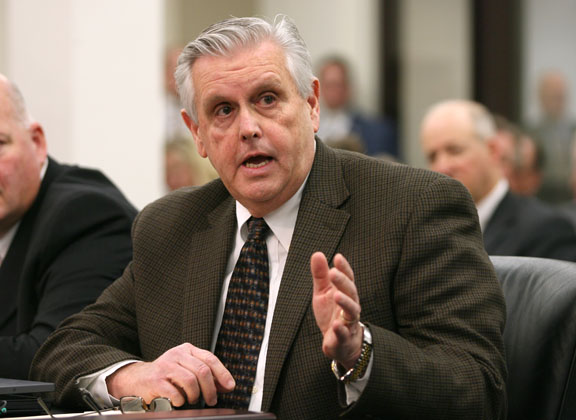
Commissioner Terry Holliday testifies to the House Education Committee in support of the Graduation Bill and in support of no cuts to education funding in 2012 at the Capitol annex building March 15, 2011 in Frankfort. Photo by Amy Wallot
By Tracy Goff Herman
tracy.herman@education.ky.gov
With 1,150 bills and resolutions filed, the 2011 regular session of the General Assembly ended a little sooner than expected. However, Gov. Steve Beshear called a special session of the General Assembly the next day to try to reach a compromise on the Medicaid budget, which is facing a significant shortfall.
During the March special session, the General Assembly passed HB 1, which amends the current budget. HB 1 requires the governor to save money under a managed care plan for Medicaid. Before the governor’s veto, the bill also would have required additional cuts to state agencies including cuts to the Support Education Excellence in Kentucky (SEEK) fund – if those savings were not realized. The governor vetoed all of the new provisions and retained the original plan to restructure Medicaid in an effort to eliminate the shortfall.
The effective date of all legislation from the regular session is June 8, 2011, except for those bills with an emergency clause, which take effect upon the governor’s approval, including HB 1 that passed during the special session.
There were six bills that passed dealing with education. Those bills are:
SB 12
After several attempts in previous sessions to redefine the principal-selection process, legislators finally forged a compromise allowing superintendents a greater role in replacing outgoing principals. SB 12 amends KRS 160.345 regarding principal selection.
First, it requires the superintendent to provide additional qualified applicants to the principal upon his or her request regarding a principal vacancy.
Second, if there is a principal vacancy, the outgoing principal cannot serve on the school-based decision making council during his or her replacement-selection process. Instead, the superintendent or his or her designee will serve as the chair of the council during the selection process and have voting rights.
Third, the council must have the applications of all of those who applied for the position and who are certified for the position.
Fourth, the new principal must be elected on a majority vote of the membership of the council.
Finally, the new law also prohibits any principal who has been removed from a position in the district for cause to be considered for appointment as a principal.
HB 192
This bill creates a new section of KRS 158 related to voting instruction. The new language requires every high school to provide 12th graders information on how to register to vote and how to use a ballot and an absentee ballot. There are no prohibitions on how schools may disseminate this information.
HB 425
The first section of the bill amends KRS 163.032. The statute has always required the Kentucky Department of Education, along with the Personnel Cabinet, to adopt a salary schedule for administrators at the Kentucky School for the Blind and the Kentucky School for the Deaf. The updated language provides how the department and the cabinet establish rates of pay and requires the computation to be done by Sept. 1 rather than Aug. 1 of each year.
HB 427
There were several calendar bills filed this session. All those bills failed, but some calendar language was attached to this bill.
The first section focuses on amending KRS 161.185 to require classified or certified staff to accompany students on school-sponsored, non-athletic field trips. This provision replaces language that said “school faculty or a member of the administrative staff.” This has been the practice in many districts, and the intent was to update statutory language to match district practice.
There are two primary additions regarding school calendars.
Section 2 of the bill provides statutory reference for the “snow-bound pilot” projects. The project is designed to assist school districts, primarily in eastern Kentucky, that have missed an average of 20 or more days over the last three years due to inclement weather and other emergency situations. The intent of the program is provide opportunities for alternative methods of instruction, such as virtual, so that these districts can provide instruction on what would traditionally be a snow day.
Other sections add language related to school calendars for the 2010-11 school year.
Section 3 allows the commissioner of education to grant a request to waive making up instructional days scheduled for after June 21 if the makeup days in the calendar have all been used.
Section 4 allows districts that add at least 30 minutes a day to count the time for both hour and day requirements. Districts will not have to submit a calendar with 1,062 hours but fewer than 170 days for the Department of Education’s approval, as they would under the innovative calendar requirements, if they add at least 30 minutes per day.
Districts still may amend their calendars from one minute to 29 minutes. However, if they do, the new provision does not apply, and districts must have at least 170 six-hour days and 1,062 hours. The one to 29 minutes cannot be used to make up days.
These requirements take effect immediately.
HB 428
This bill addresses a situation in Lyon County where the middle school, built in 2003, has been condemned and is uninhabitable. While the district is involved in a lawsuit, the General Assembly is directing the Department of Education to provide money to either retire the unpaid debt or provide the semi-annual debt service payments. If money is not available from the department, it will be paid from the state’s general fund.
If the district receives money from the outcome of the trial, the district must repay the budget reserve trust fund account. This law is effective immediately.
HB 464
The bill creates a new section of KRS 156 to require the Department of Education to develop procedures for reviewing and resolving claims of factual errors found in textbooks adopted by the State Textbook Commission. The department has already done so in KAR 704 3:455 to address the provisions outlined in the bill.
Resolutions
Two resolutions of note deal with children’s health issues and how schools address them.
HCR 13
This resolution creates a Legislative Task Force on Childhood Obesity. The task force will meet at least monthly during the 2011 interim of the General Assembly. The final task force recommendations and findings must be reported to the Legislative Research Commission and the Interim Joint Committee on Health and Welfare by Nov. 30, 2011. The Department of Education and other state government agencies dealing with children likely will present information about how they interact with children’s health issues.
HR 187
This resolution encourages the Kentucky Department of Education, the Kentucky Board of Nursing, the Kentucky Education Association and the Kentucky School Boards Association to work with the American Diabetes Association, the Epilepsy Foundation of Kentucky and the American Lung Association to develop a plan to raise awareness among public school personnel about the chronic health conditions of asthma, diabetes, epilepsy and severe allergies. This plan should include how to recognize a chronic health condition episode and how to respond to chronic health condition episodes. It also encourages the departments of Education, Public Health and Medicaid Services to determine if there are any unidentified barriers in practice now.
The Department of Education already works with these groups on a variety of initiatives, including issues related to students with chronic health conditions.
Other resolutions:
• SR 88
Recognizes and honors Laureen Laumeyer, 5th-grade teacher at Meadow View Elementary School (Hardin County) for being selected as the National Mission U.S. Educator of the Year.
• SR 218
Confirms the gubernatorial appointment of Mary Gwen Wheeler to the Kentucky Board of Education representing the Fourth Supreme Court District for a term ending April 14, 2014.
• SR 226
Confirms the gubernatorial reappointment of Judith H. Gibbons to the Kentucky Board of Education representing the Sixth Supreme Court District for a term ending April 14, 2014.
• SR 227
Confirms the gubernatorial reappointment of C. B. Akins Sr. to the Kentucky Board of Education representing the Fifth Supreme Court District for a term ending April 14, 2014.
• SR 228
Confirms the gubernatorial appointment of Jonathan V. Parrent to the Kentucky Board of Education representing the First Supreme Court District for a term ending April 14, 2014.
• SR 229
Confirms the gubernatorial appointment of William L. Twyman to the Kentucky Board of Education representing the Second Supreme Court District for a term ending April 14, 2014.
• SR 230
Confirms the gubernatorial appointment of Roger L. Marcum to the Kentucky Board of Education representing the Third Supreme Court District for a term ending April 14, 2014.
• SR 231
Confirms the gubernatorial appointment of Martha M. Jones to the Kentucky Board of Education representing the Seventh Supreme Court District for a term ending April 14, 2104.
• HR 129
Urges the Kentucky Department of Education, if funding is available, to evaluate the effectiveness of intervention programs available for K-2 remediation and to make the results available to the public.
• HR 165
Adjourns in honor of Rowan County Senior High School student Hannah Mabry for discovering a rare pulsar.
MORE INFO …
Legislative Research Commission



Leave A Comment